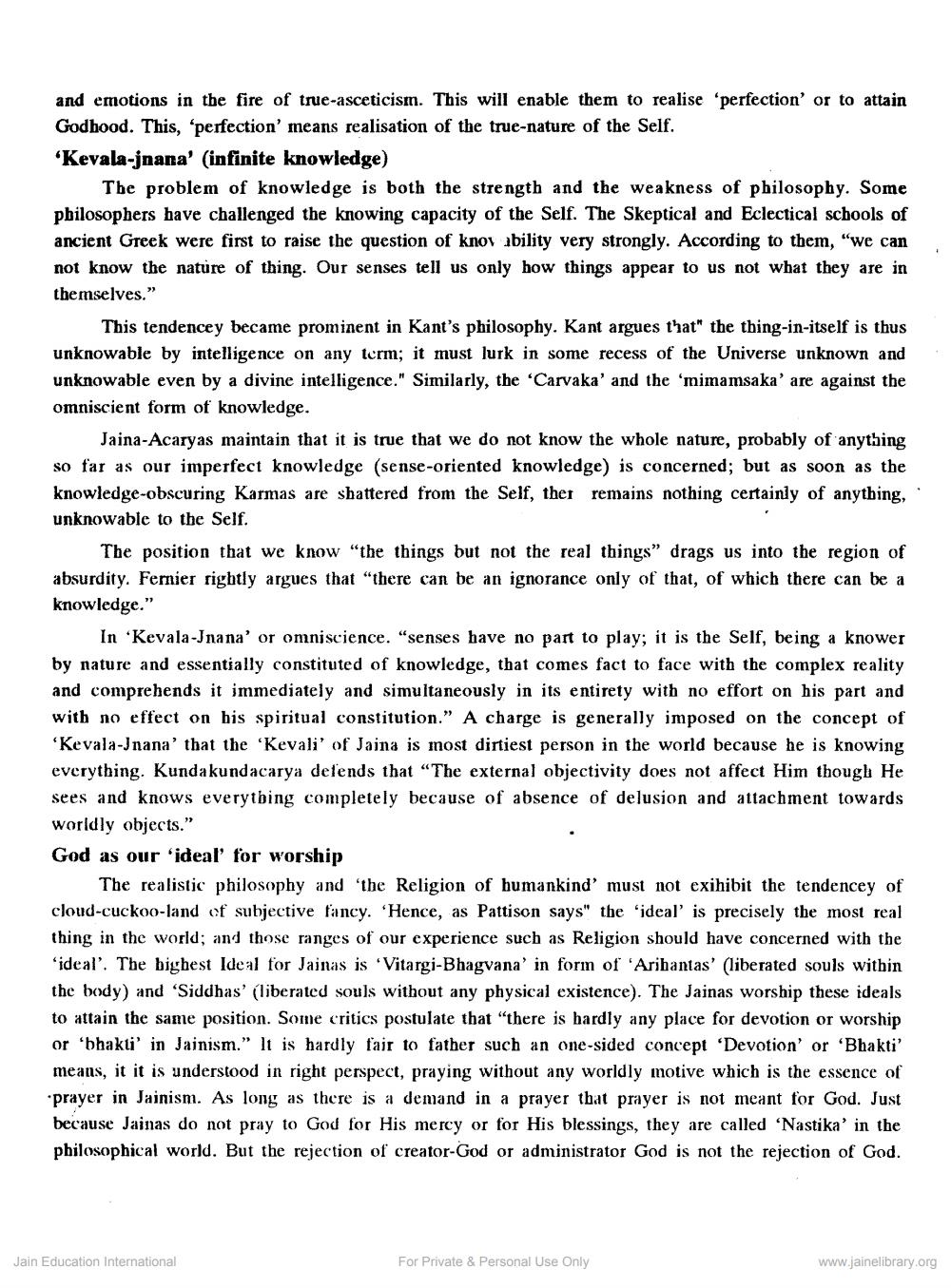________________
and emotions in the fire of true-asceticism. This will enable them to realise 'perfection' or to attain Godhood. This, 'perfection' means realisation of the true-nature of the Self.
'Kevala-jnana' (infinite knowledge)
The problem of knowledge is both the strength and the weakness of philosophy. Some philosophers have challenged the knowing capacity of the Self. The Skeptical and Eclectical schools of ancient Greek were first to raise the question of know ability very strongly. According to them, "we can not know the nature of thing. Our senses tell us only how things appear to us not what they are in themselves."
This tendencey became prominent in Kant's philosophy. Kant argues that the thing-in-itself is thus unknowable by intelligence on any term; it must lurk in some recess of the Universe unknown and unknowable even by a divine intelligence." Similarly, the 'Carvaka' and the 'mimamsaka' are against the omniscient form of knowledge.
Jaina-Acaryas maintain that it is true that we do not know the whole nature, probably of anything so far as our imperfect knowledge (sense-oriented knowledge) is concerned; but as soon as the knowledge-obscuring Karmas are shattered from the Self, ther remains nothing certainly of anything. unknowable to the Self.
The position that we know "the things but not the real things" drags us into the region of absurdity. Fernier rightly argues that "there can be an ignorance only of that, of which there can be a knowledge."
In 'Kevala-Jnana' or omniscience. "senses have no part to play; it is the Self, being a knower by nature and essentially constituted of knowledge, that comes fact to face with the complex reality and comprehends it immediately and simultaneously in its entirety with no effort on his part and with no effect on his spiritual constitution." A charge is generally imposed on the concept of 'Kevala-Jnana' that the 'Kevali' of Jaina is most dirtiest person in the world because he is knowing everything. Kundakundacarya defends that "The external objectivity does not affect Him though He sees and knows everything completely because of absence of delusion and attachment towards worldly objects."
God as our 'ideal' for worship
The realistic philosophy and 'the Religion of humankind' must not exihibit the tendencey of cloud-cuckoo-land of subjective fancy. 'Hence, as Pattison says" the 'ideal' is precisely the most real thing in the world; and those ranges of our experience such as Religion should have concerned with the 'ideal'. The highest Ideal for Jainas is 'Vitargi-Bhagvana' in form of 'Arihantas' (liberated souls within the body) and 'Siddhas' (liberated souls without any physical existence). The Jainas worship these ideals to attain the same position. Some critics postulate that "there is hardly any place for devotion or worship or 'bhakti' in Jainism." It is hardly fair to father such an one-sided concept 'Devotion' or 'Bhakti' means, it it is understood in right perspect, praying without any worldly motive which is the essence of prayer in Jainism. As long as there is a demand in a prayer that prayer is not meant for God. Just because Jainas do not pray to God for His mercy or for His blessings, they are called 'Nastika' in the philosophical world. But the rejection of creator-God or administrator God is not the rejection of God.
Jain Education International
For Private & Personal Use Only
www.jainelibrary.org




